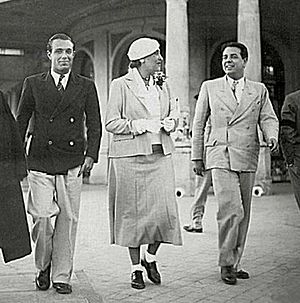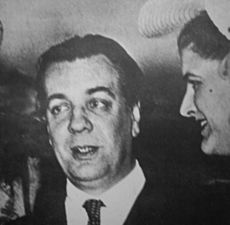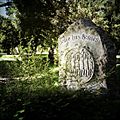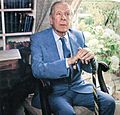Jorge Luis Borges facts for kids
Quick facts for kids
Jorge Luis Borges
|
|
|---|---|
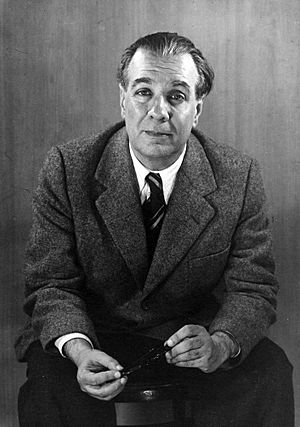
Borges in 1951
|
|
| Born | Jorge Francisco Isidoro Luis Borges Acevedo 24 August 1899 Buenos Aires, Argentina |
| Died | 14 June 1986 (aged 86) Geneva, Switzerland |
| Occupation |
|
| Language | Spanish |
| Notable works |
|
| Notable awards | Commandeur de l'Ordre des Arts et des Lettres (1962) |
| Relatives |
|
| Signature | |
 |
|
Jorge Luis Borges (born August 24, 1899 – died June 14, 1986) was an amazing writer from Argentina. He wrote short stories, poems, and essays. He was a very important figure in Spanish-language literature.
His most famous books are Ficciones (Fictions) and El Aleph (The Aleph). These books, published in the 1940s, are collections of short stories. They often explore themes like dreams, mazes, libraries, and myths. Many people think Borges's work helped start the "magic realism" style in literature.
Borges became famous around the world in 1961. He won the first Formentor prize. Later, in 1971, he won the Jerusalem Prize. He was influenced by many great writers, including Dante Alighieri and Miguel de Cervantes.
Growing Up
Jorge Francisco Isidoro Luis Borges Acevedo was born on August 24, 1899. His family was educated and middle-class. They lived in Palermo, a neighborhood in Buenos Aires, Argentina.
Borges's mother, Leonor Acevedo Suárez, came from a family with a long history. They were involved in the Argentine War of Independence. His mother often told stories of their brave actions.
When he was ten, Borges translated a story by Oscar Wilde. It was called The Happy Prince. This translation was published in a local newspaper. His friends thought his father had written it!
Borges's father was a lawyer and a teacher. He also wanted to be a writer. Borges later said his father "tried to become a writer and failed." Borges felt a bit ashamed because his family were soldiers, and he was "a bookish kind of person."
Borges was taught at home until he was 11. He learned both Spanish and English very well. He could read Shakespeare in English when he was only twelve. His family had a huge library with over a thousand books. Borges often said this library was the most important event in his life.
In 1914, his father's eyesight started to fail. Because of this, the family moved to Geneva, Switzerland. They stayed in Europe for ten years. In Geneva, Borges learned French and read philosophy in German. He finished school in 1918. The family stayed in Switzerland during World War I because of problems in Argentina. After the war, they lived in different cities in Europe until 1921.
Becoming a Writer
In 1921, Borges and his family returned to Buenos Aires. Two years later, in 1923, he published his first book of poetry. It was called Fervor de Buenos Aires.
Borges started writing for Sur magazine in 1931. This was Argentina's most important literary magazine. It helped him become famous. Through the magazine, he met Adolfo Bioy Casares. They became close friends and wrote many works together. Sometimes they used a made-up name, H. Bustos Domecq.
In 1933, Borges got a job at a newspaper's literary section. Here, he first published stories that became A Universal History of Infamy in 1935. This book mixed true stories with fictional ones. It also included "literary forgeries," which were stories Borges pretended were translations of old works.
From 1936 to 1939, he wrote weekly columns for El Hogar magazine. In 1938, Borges started working at the Miguel Cané Municipal Library. It was in a working-class area. He was told not to catalog too many books each day. This was so the other staff would still have work to do. So, he spent most of his time in the library's basement, writing and translating.
In 1938, Borges had a serious head injury. He almost died from an infection while recovering. After this accident, Borges started writing in a new style. This style made him famous. His first story written after the accident was "Pierre Menard, Author of the Quixote." It explored ideas about what it means to be an author.
His first collection of short stories, The Garden of Forking Paths, came out in 1941. These stories had mostly been published in Sur magazine. The book was well-received. However, it did not win the literary prizes that many expected it to.
As his eyesight began to get worse, Borges started giving public lectures. He also began writing screenplays. In 1955, he became the director of the Argentine National Library. By the late 1950s, he was completely blind.
His later poetry collection, In Praise of Darkness, talks about his blindness. In 1956, he received an honorary doctorate from the University of Cuyo. The next year, he won the National Prize for Literature. From 1956 to 1970, Borges was also a literature professor at the University of Buenos Aires. In 1964, Queen Elizabeth II made him a knight.
As Borges's eyesight got worse, his mother helped him more and more. He could no longer read or write on his own. So, his mother became his personal secretary. In 1973, he resigned from his job at the National Library.
In 1961, Borges shared the first Prix International with Samuel Beckett. Before this award, Borges was not well-known in English-speaking countries. The prize made many people interested in his work.
From 1967, Borges worked with an American translator, Norman Thomas di Giovanni. This helped his books become more popular in English.
Borges kept publishing books. These included Book of Imaginary Beings (1967) and The Book of Sand (1975). He also gave many lectures.
From 1975 until he died, Borges traveled a lot. He was often with his personal assistant, María Kodama. In April 1986, just a few months before he passed away, he married her.
His Final Years
Borges died from liver cancer on June 14, 1986. He was 86 years old. He passed away in Geneva, Switzerland.
His funeral was held at a church in Geneva. Many important people from Switzerland and Argentina were there. Borges was buried in Geneva's Cimetière de Plainpalais. His grave has carvings inspired by old Anglo-Saxon and Norse art.
His Works
Many literary experts believe Borges was one of the most important Spanish-language writers. Some even say he was the most important since Cervantes.
Borges wrote many things besides short stories. He also wrote poetry, essays, screenplays, and literary criticism. He edited many collections of other writers' works. His longest story was only fourteen pages long. It was called "The Congress" and came out in 1971.
He was very interested in mythology, mathematics, and theology. He often wove these ideas into his stories. Sometimes he did it playfully, and sometimes very seriously.
As he lost his sight, he wrote more poetry. This was because he could memorize a whole poem as he wrote it. His poems covered the same wide range of interests as his stories.
Borges was also a talented translator. He translated works from English, French, German, Old English, and Old Norse into Spanish. He translated works by writers like Ambrose Bierce, William Faulkner, Franz Kafka, and Virginia Woolf. Borges also wrote and lectured a lot about how to translate well.
Images for kids
-
María Kodama at the 2010 Frankfurt Book Fair
-
Monument in Buenos Aires
-
Monument in Lisbon
See also
 In Spanish: Jorge Luis Borges para niños
In Spanish: Jorge Luis Borges para niños
 | Victor J. Glover |
 | Yvonne Cagle |
 | Jeanette Epps |
 | Bernard A. Harris Jr. |


